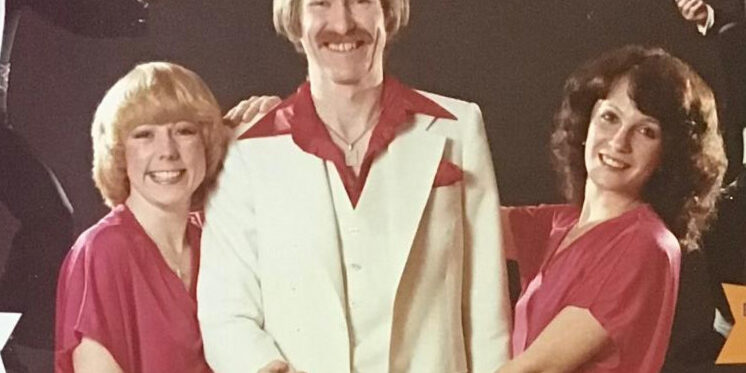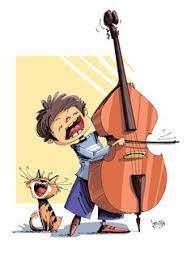Nightlife Part 1

Out Of The Blue
In mid-May of 1980, I got a call from a friend I hadn’t seen or heard from in four years. The last time we had spoken was August 1976, and I had no idea what she’d been doing, where she was living etc.
Her name was Mary-Lu Zahalan. She said she was living in Oakville and had graduated from Sheridan College’s Performing Arts Program.
She was also in a band booked at the VIP Lounge in Mississauga, a ten-minute drive from my house.
“Doing what?” I asked. The only thing I remembered her doing musically was a lame Rubato-Interuptus version of Steppenwolf’s The Pusher Man in my living room in 1976.
“Singing in a sort of comedy-music revue called Nightlife.”
Having been a professional musician at that point for over six years, I suppose my opinion of what she was doing was important to her. She suggested I come out and catch a set or two.
Shlock Rock
I did. And I was surprised. To begin with, it was absolutely not your standard format. The band consisted of a drummer, a keyboardist, and two very animated girl singers. Coquettish, confident, Mary-Lu and a cute blonde with a big smile and powerful voice, Cyd Craig. Upfront was a guy named Joe Fergus who would sing and tell jokes.
Now, this could easily have been a trip to WTF land. I was preparing not only for an excruciating evening but also for the giant elephant that would be in the room when I gave my opinion later.
But they weren’t too bad. And Joe was funny.
Sure it was thin. Just drums and a keyboard player whose left hand did all the bass. But the girls had an engaging stage presence and were professional. They looked great, and they could sing.
Joe was an excellent vocalist and had control of the room.
This would all be shmaltz of Lawrence Welkian proportion were it not for a hint of camp and an implied wink. And if there was any doubt, Joe’s hilarious, bizarre characters crushed any notion of pretension.
One character, an alcoholic, washed-up night-club entertainer, was so convincing that a club owner threatened to fire them if he went on stage drunk again.
I haven’t mentioned that the drummer was Rick Gratton. You might recall from an earlier post that he got the shit kicked out of him in an elevator in Hartford, likely because he exuded arrogance like some people sweat. It’s a trait I find more common in lead guitarists than drummers.
But he was an okay guy. I roomed with him on the Jordan tour. A lot of his hubris was feigned. And he was a kick-ass drummer.
My thoughts were that the addition of at least one more musician could really thicken up the sound to support Joe and the girls.
Mary-Lu and Rick had been thinking the same thing as I found out when I spoke to them later.
The Real Reason I was Summoned
There was another issue. The keyboard player was against traveling outside of town. Keeping the act booked every week, which they all wanted, required some road work, particularly during the summer.
Would I be interested in joining the band?
I said no.
My career had started to gain speed, and I had a plan for the rest of 1980. I was working recording sessions with three different producers. My focus was on honing my skills so that I could feel more comfortable at this new level.
Plus, I had two more commitments in my latest project with Shirley, one of which was a week in Kingston starting in three days, Monday, May 19.
I wished them well and left.
While I was in Kingston, I gave some thought to the proposal. It could be a fun gig. All the bookings were in East, Central, or Southern Ontario. I could write detailed charts and hire a sub when needed. Playing four sets a night, six days a week, would strengthen my chops.
I hadn’t met Joe yet, but I was good at spotting Show-Biz Dicks, and there were no blips on my radar. Besides, I wasn’t hearing any complaints from his band.
SBDs

The industry is rife with Show-Biz Dicks. But for most of my generation, the acronym SBD is more commonly associated with “Silent But Deadly.”
This is a stealth fart that drifts unnoticed at first but can clear a room.
Consider the stereotypical bandleader who warmly welcomes you into the fold only to detonate a four-megaton anti-ego bomb at the first available opportunity. What’s the difference?
In the days when it was common to have a guy in a white suit leading the dance hall orchestra, there was a joke:
What’s the difference between a moose and a band?
With a moose, the horns are in front and the asshole’s in the back.
On Second Thought
More and more, the job offer with Joe Fergus and Nightlife seemed a good idea, and by the time I got home, I decided to accept with one stipulation:
That they also hire a bass player.
The question of whether or not Joe liked the idea was moot. He had only four weeks left playing in-town. The summer bookings were in places like Barrie, Oshawa and Huntsville. As I said earlier, his current keyboard player was adamant about not traveling. Replacing him would be a pain in the ass, but it wasn’t the only issue. I’m just speculating, but the contracts coming up were negotiated with a smaller band in mind. The expense of an extra player would come out of Joe’s pocket.
Nevertheless, Rick and Mary-Lu sold him on the idea.
The amount of time left to transition was adequate, but I didn’t want to use up any of it auditioning bass players. Instead, I called a friend I trusted, Phil Woodard, an exceptional musician I worked with in the George Olliver band. He was busy, but he recommended Lionel Williams who had just moved back east after playing double bass in the Victoria Symphony Orchestra for two years.

“A bow jockey?” I was incredulous. “This ain’t Mozart!!!”
But Phil had a five-star credibility rating with me so I called the guy.
He came out to the VIP Lounge, really nailed a few tunes without a chart, agreed to give it a shot, and we had a band. We rocked even without a guitar player. Rick and Lionel played solid and aggressively. They were confident and it showed.
This was no time for a wimpy Fender Rhodes or one of those plastic keyboards that did a thousand half-assed sounds. I used a CP-70 electric grand piano that had a good growl in the mid range and a sparkle on top. We were versatile enough to do a sensitive ballad and then completely u-turn into some kick-ass rock and roll.
That’s the way things stood for almost four straight months of gigs playing four or five sets a night, six nights a week. That line-up changed as Lionel slammed Rick into the drywall at the back of the stage during an after-hours rehearsal melee in late October.
I made a phone call to my old buddy Hap Roderman the next morning and by evening I had once again reassembled and reinstalled the famed Rough Trade rhythm section and the comedy-music revue continued on.